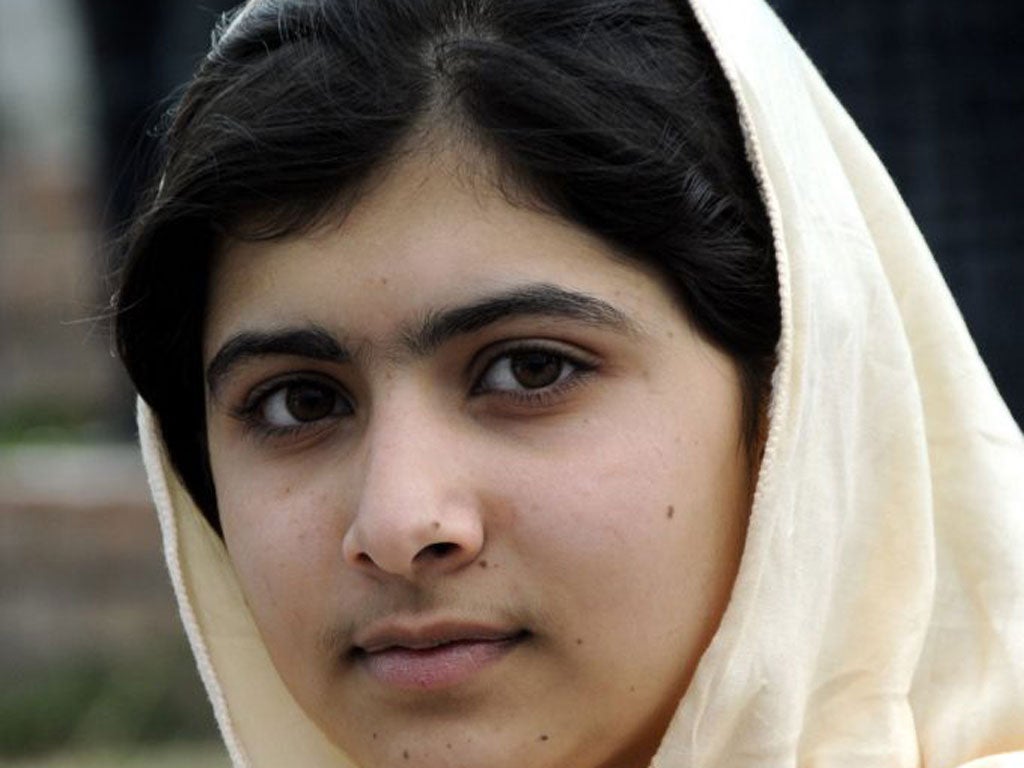Public support of Malala Yousafzai fuels a new set of conspiracy theories

Your support helps us to tell the story
From reproductive rights to climate change to Big Tech, The Independent is on the ground when the story is developing. Whether it's investigating the financials of Elon Musk's pro-Trump PAC or producing our latest documentary, 'The A Word', which shines a light on the American women fighting for reproductive rights, we know how important it is to parse out the facts from the messaging.
At such a critical moment in US history, we need reporters on the ground. Your donation allows us to keep sending journalists to speak to both sides of the story.
The Independent is trusted by Americans across the entire political spectrum. And unlike many other quality news outlets, we choose not to lock Americans out of our reporting and analysis with paywalls. We believe quality journalism should be available to everyone, paid for by those who can afford it.
Your support makes all the difference.It's a well-known fact in Pakistan that Osama bin Laden died in 2006 and the US commando raid on his compound last May was merely a "drama" orchestrated by President Barack Obama to help win his re-election.
Of course if that were true, Obama might have waited until after that first presidential debate to fake bin Laden's killing.
But no matter. Pakistanis love a good conspiracy theory.
Some national newspapers and TV cable outlets routinely report that the United States is behind terrorist attacks and supports the vicious war the Pakistani Taliban is waging against Pakistan's government and military. The U.S. Embassy in Islamabad has to regularly churn out "Corrections for the Record" that take media to task for carrying outrageous claims.
For years, nefarious NATO and U.S. warplanes, including B-52s, were sighted in the skies over Pakistan as frequently as Bigfoot and Elvis are still seen on some grassy knolls in America.
Now, the latest conspiracy theory to gain traction is the notion that America was behind the Taliban hit on Malala Yousafzai, the young Pakistani student who criticized the extremist group for denying girls education.
The purported purpose of the ruse: to make the Taliban look really, really bad, and thus generate public sympathy for CIA drone strikes — and whip up support for a Pakistani Army invasion of North Waziristan to rout out Haqqani network militants based there.
A Taliban spokesman immediately claimed responsibility for the attack on the schoolgirl and her two classmates. But no matter. The idea of U.S. involvement has spread widely, even generating its own meme on Facebook.
A photo of Obama sharing a hearty laugh with members of his staff is making the rounds, being circulated and "liked" by thousands on social media sites. Its caption reads: "Sir, they still believe that Taliban attacked Malala."
To many Pakistanis, Yousafzai is a national hero. But others claim she is a spy because she once met with the late U.S. envoy Richard Holbrooke — another photo shared on the Internet.
Part of the reason there's so much conspiracy thinking is because Pakistanis live in a security state that many believe is controlled by the shadowy spy apparatus known as Inter-Services Intelligence, or ISI. It is widely seen — and feared — as a hidden force capable of steering domestic and foreign affairs.
A.Z. Hilali, chairman of the political science department at the University of Peshawar, says politics is also behind much of the conspiracy mongering.
"When the incident happened with Malala Yousafzai, the people thought the security establishment might be involved because there is pressure from the U.S. that they have to take action against the Haqqani network," Hilali said. "That perception was already existing in Pakistan. Right-wing parties just exploited the situation."
But now, said Hilali, "Right wing parties are in a great crisis because Malala has deep sympathies from the common people. . . . They believe the Taliban has crossed a boundary. Malala has become this symbol and the right wing is losing support."
International relations professor Nasreen Ghufran said a common sentiment in Peshawar is that the horrendous deed had to serve other agendas. "They think that Taliban on their own would not do anything unless the ISI and the army is behind it," she said.
There was good reason to think the U.S. was pushing for an operation in North Waziristan. In August, U.S. Defense Secretary Leon Panetta said Pakistan's military leaders "had developed plans to go into Waziristan. . . . Our understanding is that hopefully they're going to take that step in the near future."
Pakistan denied it, saying its military lacked the manpower to do it and they never did.
As for the theories that besmirch Yousafzai as an agent of the West, they will ultimately come to naught and even enhance her stature, said Hilali. The Islamists "were already against that girl, but there is not just one Malala, there are many Malalas."
Join our commenting forum
Join thought-provoking conversations, follow other Independent readers and see their replies
Comments